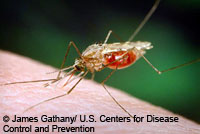Body odour key to repelling mosquitoes
Researchers from the UK may have found a new and non-invasive technique for preventing the spread of mosquito-borne diseases, such as malaria, dengue fever, chikungunya and yellow fever. Malaria is one of the 'big three' killers, along with HIV/AIDS and tuberculosis. Malaria alone is estimated to kill more than 1.2 million people per year. Visitors to mosquito-infested areas will have noticed that these irritating, biting insects seem to be selective - victimising some people, while leaving others almost entirely alone. Odour has long been considered to be a factor, leading some to adopt the anecdotal solution of consuming quantities of garlic, chillies and alcohol - because the mosquitoes do not like it. This could of course be a deterrent for other humans, too. 'Those of us who don't get bitten by mosquitoes produce unattractive chemicals, which mask their otherwise attractive odours,' said Professor John Pickett from Rothamsted research, who conducted the research with a team from Aberdeen University. This quest for a solution to this enduring problem features in the UK's Royal Society Summer Science Exhibition, which opens on 3 July. 'Humans produce hundreds of different chemicals so it has been challenging to identify the particular chemicals that mosquitoes respond to,' said Professor Pickett. To eke out these mosquito-unfriendly chemicals that could save lives, the team used a technique known as 'gas chromatography-electroantennography', which separates the odours into their constituent components, and then allows each separate odour to be tested against mosquito antennae, to see whether the mosquitoes 'like' or 'dislike' the odour. The team has filed patents based upon their research, and will shortly publish its findings. The technique also gives the researchers the chance to investigate other biting insects, and not just those targeting humans. Biting insects are a huge problem for farmers and their livestock. Perhaps the most attractive part of the technology could be that products would be 'natural' or at least based upon naturally occurring compounds found in humans. Many of the prophylactic drugs used today to prevent diseases such as malaria are effectively low doses of poison, sufficient to kill the malarial parasite, but not the human host. Some malarial prophylactics and repellents have been known to cause unpleasant side effects. The team is conducting clinical trials now, and is quietly confident of a good result. 'We are currently testing the natural compounds by comparing them with World Health Organisation approved insect repellents on individuals known to be attractive to mosquitoes - we hope to publish these results soon,' said Professor Pickett. This will not end further research into the mosquito, and in particular malaria. The life-cycle of the malarial parasite is extremely complicated, and the focus of a number of research avenues. Investor Warren Buffett recently gave the bulk of his fortune to the Bill and Melinda Gates foundation, which has malaria high on its hit-list.
Countries
United Kingdom



